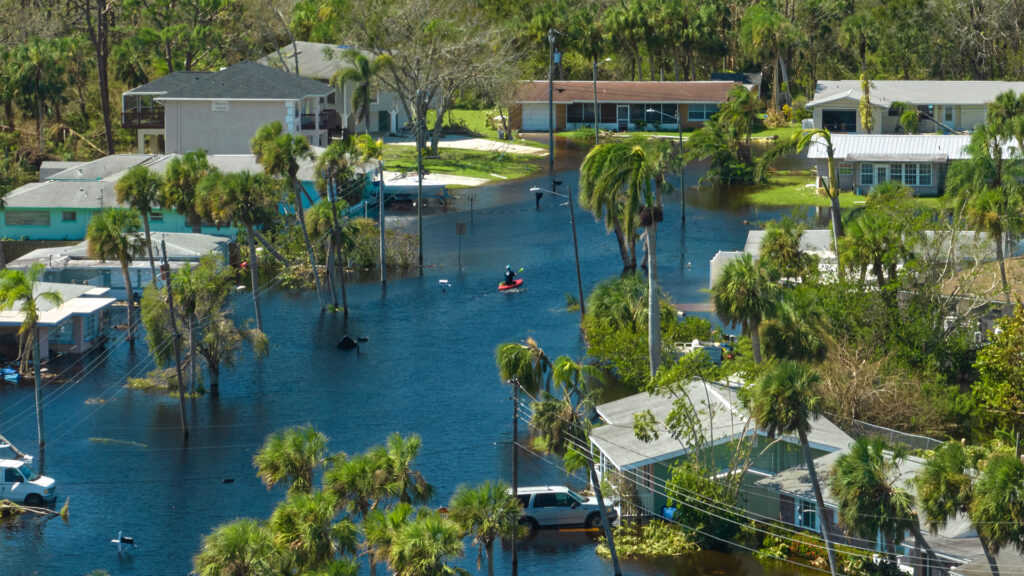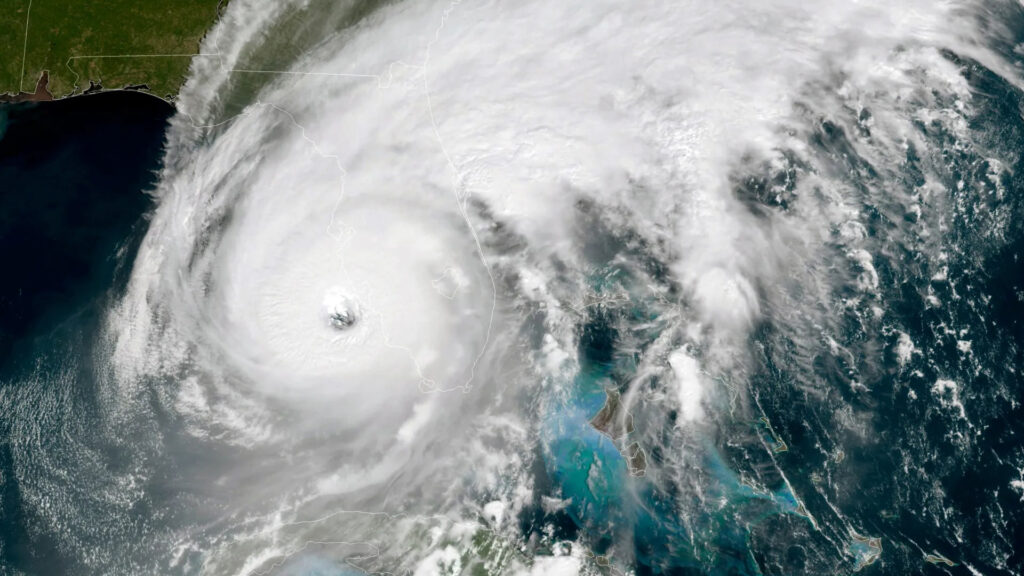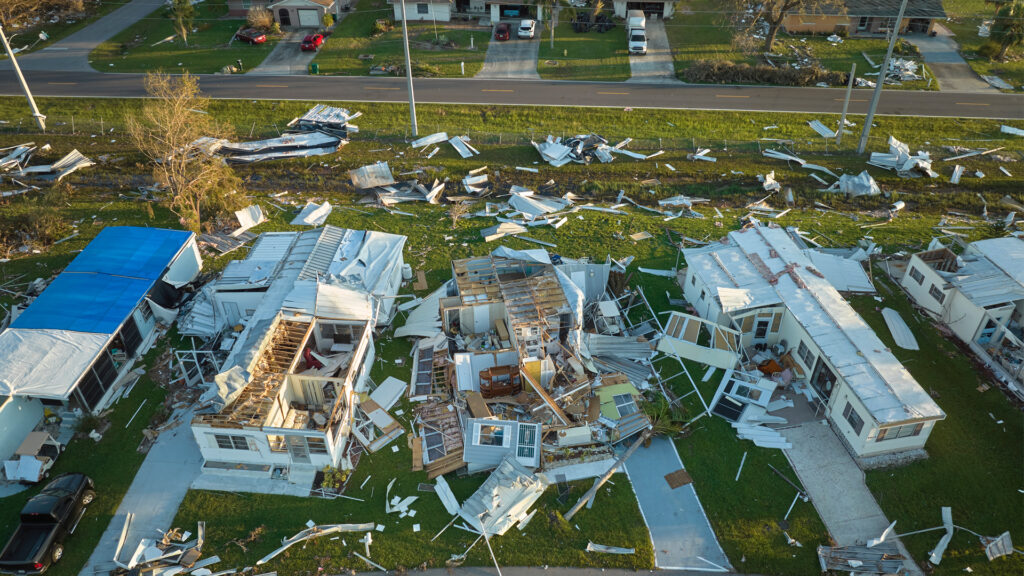By Kristan Reynolds, The Invading Sea
When Hurricane Ian hit Florida in September 2022, Ken Gurtner and Teresa Merck woke up to find the bottom floor of their family’s home submerged. Without flood insurance, the family could only watch as the water overtook their home in the Central Florida city of Oviedo, leaving them with just their personal belongings.
The family and their dogs waded through knee-deep water to a neighbor’s house, where they stayed for 10 days before relocating to temporary housing in nearby Sanford for six months. Once the water receded, about 30 neighbors and friends helped the family bring their furniture and other water-soaked items to the dump.
“All the debris that needed to be taken away was gone in that one day,” said Gurtner, 51. “That was one of the most profound, humbling human experiences in my life — people came and helped us.”
The family’s experience influenced their views in a way similar to others who have gone through climate disasters such as hurricanes. These disasters are likely to cause positive attitudes toward climate migrants and a heightened belief in climate change, according to a recent study.
The study by Princeton University researchers Sabrina Arias and Christopher Blair defined a climate migrant as someone who has either been forced to leave their community or chooses to leave due to changes in their local environment that negatively affect their living conditions. This definition aligns with that of the International Organization for Migration.

The research measured attitudes toward climate migration and climate change in the U.S. Southeast before, during and after Hurricane Ian. The results revealed that people impacted by Hurricane Ian were more likely to have positive attitudes toward climate migrants, recognize climate migration and climate change as important issues, and support policies that assist climate migrants and combat climate change.
Experiencing a climate disaster allows people to put themselves in the shoes of a climate migrant, said Arias, a postdoctoral research associate at Princeton University’s Niehaus Center for Globalization and Governance. She theorized that this caused more positive attitudes toward climate migrants.
The study found that these attitudes were short-lived, but were strongest among vulnerable populations and transcended differences such as political party.
“We do find that there are differences in their beliefs about climate science, but for the most part, we find these effects are essentially identical across partisan lines,” Arias said.
Mathew Hauer, a sociologist and demographer at Florida State University who wasn’t involved in this research but specializes in the study of climate migration, said that bipartisan support for climate migrants after a hugely disruptive hurricane is not surprising.
“We know that environmental events have a tendency to coalesce public support around them, and we’ve done this for a number of years, going back to the 1980s with the Valdez oil spill,” Hauer said. “It was a major shock, something that transcends demographics, political orientation, class and so on.”

Hurricane Ian was the third-costliest disaster in U.S. history with a total of $113 billion in damages, according to the report. After making landfall in Florida on September 28, 2022, the storm killed 155 people and displaced more than 50,000 individuals.
“This is something that is already happening across the United States,” Hauer said about climate migration. “And it’s going to continue to happen, probably with increasing frequency as the century progresses.”
The researchers of the new study on attitudes toward climate migration conducted a follow-up study six months after the hurricane. It found that the supportive attitudes decreased, indicating that climate-induced weather events have a significant impact on public opinion, but only for a short period of time, Arias said.
“For advocates and interest groups and politicians who care about moving forward policies that are going to help address climate migration, it’s really important to act quickly when these types of events happen, in order to coincide those efforts with increased levels of public support that we observe,” she said.
According to the research, vulnerable populations, such as low-income individuals who often live in geographically at-risk areas, had the strongest positive responses toward climate migrants and climate change.
Vulnerable populations “have less resources or potentially kin networks if they do have to move to another location,” Arias said. “They’re also the most likely to face pushback from recipient communities, like lower levels of support for being resettled in new regions.”
Teresa Merck, 49, said that her family’s experience with Hurricane Ian created “lots of empathy” for other families and friends who went through similar experiences.
She added that working at Oviedo High School allowed her to support students affected by flooding. The school was actively involved in helping students, including those who couldn’t get to school when Lake Harney flooded, and Merck was able to contribute to those efforts.

Hauer emphasized the importance of resiliency measures that allow people to stay in or rebuild their homes after a disaster, as well as support systems in areas where climate migrants are moving. But he said that those who tend to migrate after climate-induced events might be renters rather than homeowners and are often younger.
“Those who are most mobile tend to be the ones who are most likely to migrate,” he said. “The people who are left behind tend to be older, so you end up with an aging effect in areas that are seeing large amounts of out-migration.”
Once the Merck-Gurtner family home was repaired from flood damage, they moved back in for a short time.
“I definitely had some of those PTSD feelings when a storm would come and you see the Econ (River) rising, or you hear it on the news,” Merck said. “Almost like, ‘I don’t want to relive this’ when a storm would come.”
Recently, the family relocated to a home in New Smyrna Beach after thorough research on flood risk and discussions with neighbors about flood history. They also elected to purchase flood insurance, despite being advised it wasn’t necessary.
“Since we’ve moved, it’s a different environment,” Merck said. “We haven’t seen any water rising or anything, so for me, it’s different.”
Kristan Reynolds is a Florida Atlantic University senior graduating with a major in multimedia journalism and minor in communication studies who reported for The Invading Sea during the summer 2024 semester.
Sign up for The Invading Sea newsletter by visiting here. If you are interested in submitting an opinion piece to The Invading Sea, email Editor Nathan Crabbe at nc*****@*au.edu



